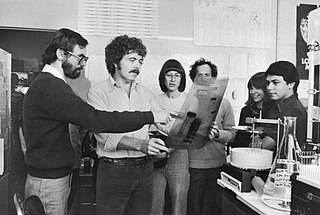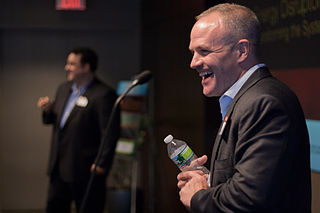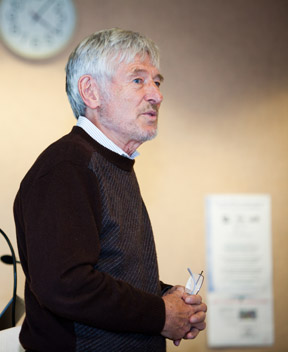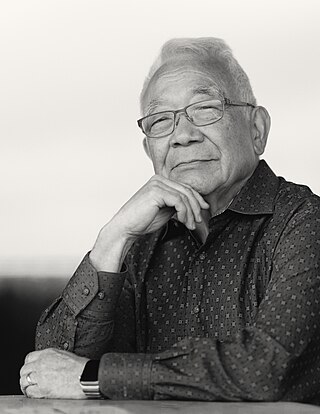
The University of California, San Francisco (UCSF), is a public land-grant research university in San Francisco, California, United States. It is part of the University of California system and is dedicated entirely to health science and life science. It conducts research and teaching in medical and biological sciences.

Herbert Wayne "Herb" Boyer is an American biotechnologist, researcher and entrepreneur in biotechnology. Along with Stanley N. Cohen and Paul Berg, he discovered recombinant DNA, a method to coax bacteria into producing foreign proteins, which aided in jump-starting the field of genetic engineering.
William Cumming Rose was an American biochemist and nutritionist. He discovered the amino acid threonine, and his research determined the necessity for essential amino acids in diet and the minimum daily requirements of all amino acids for optimal growth.

Bruce Michael Alberts is an American biochemist and the Emeritus Chancellor’s Leadership Chair in Biochemistry and Biophysics for Science and Education at the University of California, San Francisco. He has done important work studying the protein complexes which enable chromosome replication when living cells divide. He is known as an original author of the "canonical, influential, and best-selling scientific textbook" Molecular Biology of the Cell, as an Editor-in-Chief of Science magazine. He was awarded the National Medal of Science for "intellectual leadership and experimental innovation in the field of DNA replication, and for unparalleled dedication to improving science education and promoting science-based public policy" in 2014.

Joseph Lyman DeRisi is an American biochemist, specializing in molecular biology, parasitology, genomics, virology, and computational biology.
Arthur D. Levinson is an American businessman and is the chairman of Apple Inc. (2011–present) and chief executive officer (CEO) of Calico. He is the former CEO (1995–2009) and chairman (1999–2014) of Genentech.

Peter Walter is a German-American molecular biologist and biochemist. He is currently the Director of the Bay Area Institute of Science at Altos Labs and an emeritus professor at the Department of Biochemistry and Biophysics of the University of California, San Francisco (UCSF). He was a Howard Hughes Medical Institute (HHMI) Investigator until 2022.

Jay D. Keasling is a professor of chemical engineering and bioengineering at the University of California, Berkeley. He is also associate laboratory director for biosciences at the Lawrence Berkeley National Laboratory and chief executive officer of the Joint BioEnergy Institute. He is considered one of the foremost authorities in synthetic biology, especially in the field of metabolic engineering.

The California Institute for Quantitative Biosciences (QB3) is a nonprofit research and technology commercialization institute affiliated with three University of California campuses in the San Francisco Bay Area: Berkeley, San Francisco, and Santa Cruz. QB3's domain is the quantitative biosciences: areas of biology in which advances are chiefly made by scientists applying techniques from physics, chemistry, engineering, and computer science.

Pablo Valenzuela is a Chilean biochemist dedicated to biotechnology development. He is known for his genetic studies of hepatitis viruses; participated as R&D Director in the discovery of hepatitis C virus and the invention of the world's first recombinant vaccine. He is one of the cofounders of the biotechnology company Chiron Corporation and of Fundacion Ciencia para la Vida, a private non profit institution where he is currently working.

Regis Baker Kelly OBE is a neuroscientist and university administrator who develops academia-industry partnerships and supports early-stage entrepreneurship in the life sciences.

Keith R. Yamamoto is vice chancellor of Science Policy and Strategy and professor of Cellular and Molecular Pharmacology at the University of California, San Francisco, (UCSF). He is known for his Molecular Biology and Biochemistry research on nuclear receptors and his involvement in science policy and precision medicine.
David A. Agard is a professor of biochemistry and biophysics at the University of California, San Francisco. He earned his B.S. in molecular biochemistry and biophysics from Yale University and his Ph.D. in biological chemistry from California Institute of Technology. His research is focused on understanding the basic principles of macromolecular structure and function. He is a scientific director of the Institute for Bioengineering, Biotechnology, and Quantitative Biomedical Research and has been a Howard Hughes Medical Institute (HHMI) investigator since 1986.
Robert Thomas Fraley was executive vice president and chief technology officer at Monsanto, where he helped to develop the first genetically modified seeds. He retired from Monsanto in June 2018. He advocates for the use of GMO products to address global food insecurity and reduce the environmental footprint of agriculture.
Leor S. Weinberger is an American virologist and quantitative biologist. He is credited with discovering the HIV virus latency circuit, which provided the first experimental evidence that stochastic fluctuations ('noise') in gene expression are used for cell fate decisions. He has also pioneered the concept of therapeutic interfering particles, or “TIPs”, which are resistance-proof antivirals. His TED talk on this novel antiviral approach 20 years in the making has been called a "highlight" of TED and received a standing ovation from the live audience. Weinberger's TIP discovery was profiled in Science magazine and by Carl Zimmer in The New York Times.

The UCSF Library is the library of the University of California, San Francisco. It is one of the world's foremost libraries in the health sciences.
Zena Werb was a professor and the Vice Chair of Anatomy at the University of California, San Francisco. She was also the co-leader of the Cancer, Immunity, and Microenvironment Program at the Hellen Diller Family Comprehensive Cancer Center and a member of the Executive Committee of the Sabre-Sandler Asthma Basic Research Center at UCSF. Her research focused on features of the microenvironment surrounding cells, with particular interest in the extracellular matrix and the role of its protease enzymes in cell signaling.
The UCSF Graduate Division is the graduate school of the University of California, San Francisco, and is located in San Francisco. It is recognized as one of the premier biomedical graduate schools in the United States. It offers 19 PhD programs, 11 MS programs, two certificates and a physical therapy program.
Margaret A. Phillips is an American biologist who is the Sam G. Winstead and F. Andrew Bell Distinguished Chair in Biochemistry at the University of Texas Southwestern Medical Center. She was elected a Fellow of the National Academy of Sciences in 2021.
Danica Galonić Fujimori is a Serbian-American chemical biologist who is a professor at the University of California, San Francisco. Her research considers nucleic acid synthesis and tissue engineering. In the search for new therapeutics and vaccines, she has studied the interactions between ribosomes and SARS-CoV-2.











